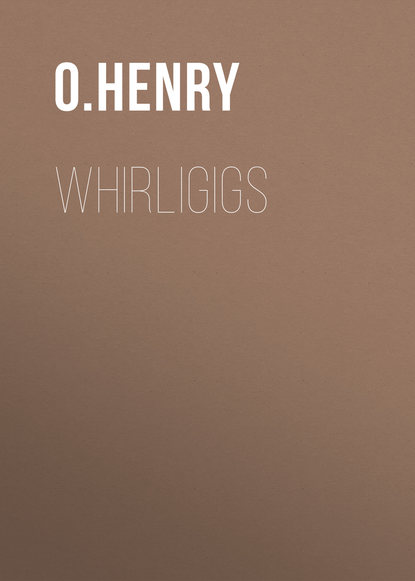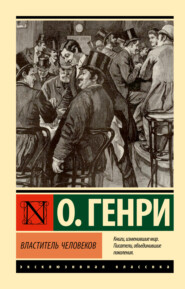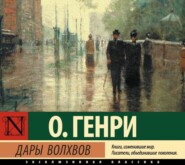По всем вопросам обращайтесь на: info@litportal.ru
(©) 2003-2025.
✖
Whirligigs
Настройки чтения
Размер шрифта
Высота строк
Поля
All looked up wonderingly. Reeves found the sheriff's mild eye resting upon him. He flushed a little.
"See here," he said, with some asperity, "my name's Reeves, and I don't want you to – " But the comedy of the thing came to his rescue, and he ended with a laugh.
"I suppose, Mr. Plunkett," said Morgan, carefully seasoning an alligator pear, "that you are aware of the fact that you will import a good deal of trouble for yourself into Kentucky if you take back the wrong man – that is, of course, if you take anybody back?"
"Thank you for the salt," said the sheriff. "Oh, I'll take somebody back. It'll be one of you two gentlemen. Yes, I know I'd get stuck for damages if I make a mistake. But I'm going to try to get the right man."
"I'll tell you what you do," said Morgan, leaning forward with a jolly twinkle in his eyes. "You take me. I'll go without any trouble. The cocoanut business hasn't panned out well this year, and I'd like to make some extra money out of your bondsmen."
"That's not fair," chimed in Reeves. "I got only $16 a thousand for my last shipment. Take me, Mr. Plunkett."
"I'll take Wade Williams," said the sheriff, patiently, "or I'll come pretty close to it."
"It's like dining with a ghost," remarked Morgan, with a pretended shiver. "The ghost of a murderer, too! Will somebody pass the toothpicks to the shade of the naughty Mr. Williams?"
Plunkett seemed as unconcerned as if he were dining at his own table in Chatham County. He was a gallant trencherman, and the strange tropic viands tickled his palate. Heavy, commonplace, almost slothful in his movements, he appeared to be devoid of all the cunning and watchfulness of the sleuth. He even ceased to observe, with any sharpness or attempted discrimination, the two men, one of whom he had undertaken with surprising self-confidence, to drag away upon the serious charge of wife-murder. Here, indeed, was a problem set before him that if wrongly solved would have amounted to his serious discomfiture, yet there he sat puzzling his soul (to all appearances) over the novel flavour of a broiled iguana cutlet.
The consul felt a decided discomfort. Reeves and Morgan were his friends and pals; yet the sheriff from Kentucky had a certain right to his official aid and moral support. So Bridger sat the silentest around the board and tried to estimate the peculiar situation. His conclusion was that both Reeves and Morgan, quickwitted, as he knew them to be, had conceived at the moment of Plunkett's disclosure of his mission – and in the brief space of a lightning flash – the idea that the other might be the guilty Williams; and that each of them had decided in that moment loyally to protect his comrade against the doom that threatened him. This was the consul's theory and if he had been a bookmaker at a race of wits for life and liberty he would have offered heavy odds against the plodding sheriff from Chatham County, Kentucky.
When the meal was concluded the Carib woman came and removed the dishes and cloth. Reeves strewed the table with excellent cigars, and Plunkett, with the others, lighted one of these with evident gratification.
"I may be dull," said Morgan, with a grin and a wink at Bridger; "but I want to know if I am. Now, I say this is all a joke of Mr. Plunkett's, concocted to frighten two babes-in-the-woods. Is this Williamson to be taken seriously or not?"
"'Williams,'" corrected Plunkett gravely. "I never got off any jokes in my life. I know I wouldn't travel 2,000 miles to get off a poor one as this would be if I didn't take Wade Williams back with me. Gentlemen!" continued the sheriff, now letting his mild eyes travel impartially from one of the company to another, "see if you can find any joke in this case. Wade Williams is listening to the words I utter now; but out of politeness, I will speak of him as a third person. For five years he made his wife lead the life of a dog – No; I'll take that back. No dog in Kentucky was ever treated as she was. He spent the money that she brought him – spent it at races, at the card table and on horses and hunting. He was a good fellow to his friends, but a cold, sullen demon at home. He wound up the five years of neglect by striking her with his closed hand – a hand as hard as a stone – when she was ill and weak from suffering. She died the next day; and he skipped. That's all there is to it. It's enough. I never saw Williams; but I knew his wife. I'm not a man to tell half. She and I were keeping company when she met him. She went to Louisville on a visit and saw him there. I'll admit that he spoilt my chances in no time. I lived then on the edge of the Cumberland mountains. I was elected sheriff of Chatham County a year after Wade Williams killed his wife. My official duty sends me out here after him; but I'll admit that there's personal feeling, too. And he's going back with me. Mr. – er – Reeves, will you pass me a match?
"Awfully imprudent of Williams," said Morgan, putting his feet up against the wall, "to strike a Kentucky lady. Seems to me I've heard they were scrappers."
"Bad, bad Williams," said Reeves, pouring out more Scotch.
The two men spoke lightly, but the consul saw and felt the tension and the carefulness in their actions and words. "Good old fellows," he said to himself; "they're both all right. Each of 'em is standing by the other like a little brick church."
And then a dog walked into the room where they sat – a black-and-tan hound, long-eared, lazy, confident of welcome.
Plunkett turned his head and looked at the animal, which halted, confidently, within a few feet of his chair.
Suddenly the sheriff, with a deep-mouthed oath, left his seat and, bestowed upon the dog a vicious and heavy kick, with his ponderous shoe.
The hound, heartbroken, astonished, with flapping ears and incurved tail, uttered a piercing yelp of pain and surprise.
Reeves and the consul remained in their chairs, saying nothing, but astonished at the unexpected show of intolerance from the easy-going man from Chatham county.
But Morgan, with a suddenly purpling face, leaped, to his feet and raised a threatening arm above the guest.
"You – brute!" he shouted, passionately; "why did you do that?"
Quickly the amenities returned, Plunkett muttered some indistinct apology and regained his seat. Morgan with a decided effort controlled his indignation and also returned to his chair.
And then Plunkett with the spring of a tiger, leaped around the corner of the table and snapped handcuffs on the paralyzed Morgan's wrists.
"Hound-lover and woman-killer!" he cried; "get ready to meet your God."
When Bridger had finished I asked him:
"Did he get the right man?"
"He did," said the Consul.
"And how did he know?" I inquired, being in a kind of bewilderment.
"When he put Morgan in the dory," answered Bridger, "the next day to take him aboard the Pajaro, this man Plunkett stopped to shake hands with me and I asked him the same question."
"'Mr. Bridger,' said he, 'I'm a Kentuckian, and I've seen a great deal of both men and animals. And I never yet saw a man that was overfond of horses and dogs but what was cruel to women.'"
III
THE HYPOTHESES OF FAILURE
Lawyer Gooch bestowed his undivided attention upon the engrossing arts of his profession. But one flight of fancy did he allow his mind to entertain. He was fond of likening his suite of office rooms to the bottom of a ship. The rooms were three in number, with a door opening from one to another. These doors could also be closed.
"Ships," Lawyer Gooch would say, "are constructed for safety, with separate, water-tight compartments in their bottoms. If one compartment springs a leak it fills with water; but the good ship goes on unhurt. Were it not for the separating bulkheads one leak would sink the vessel. Now it often happens that while I am occupied with clients, other clients with conflicting interests call. With the assistance of Archibald – an office boy with a future – I cause the dangerous influx to be diverted into separate compartments, while I sound with my legal plummet the depth of each. If necessary, they may be baled into the hallway and permitted to escape by way of the stairs, which we may term the lee scuppers. Thus the good ship of business is kept afloat; whereas if the element that supports her were allowed to mingle freely in her hold we might be swamped – ha, ha, ha!"
The law is dry. Good jokes are few. Surely it might be permitted Lawyer Gooch to mitigate the bore of briefs, the tedium of torts and the prosiness of processes with even so light a levy upon the good property of humour.
Lawyer Gooch's practice leaned largely to the settlement of marital infelicities. Did matrimony languish through complications, he mediated, soothed and arbitrated. Did it suffer from implications, he readjusted, defended and championed. Did it arrive at the extremity of duplications, he always got light sentences for his clients.
But not always was Lawyer Gooch the keen, armed, wily belligerent, ready with his two-edged sword to lop off the shackles of Hymen. He had been known to build up instead of demolishing, to reunite instead of severing, to lead erring and foolish ones back into the fold instead of scattering the flock. Often had he by his eloquent and moving appeals sent husband and wife, weeping, back into each other's arms. Frequently he had coached childhood so successfully that, at the psychological moment (and at a given signal) the plaintive pipe of "Papa, won't you tum home adain to me and muvver?" had won the day and upheld the pillars of a tottering home.
Unprejudiced persons admitted that Lawyer Gooch received as big fees from these reyoked clients as would have been paid him had the cases been contested in court. Prejudiced ones intimated that his fees were doubled, because the penitent couples always came back later for the divorce, anyhow.
There came a season in June when the legal ship of Lawyer Gooch (to borrow his own figure) was nearly becalmed. The divorce mill grinds slowly in June. It is the month of Cupid and Hymen.
Lawyer Gooch, then, sat idle in the middle room of his clientless suite. A small anteroom connected – or rather separated – this apartment from the hallway. Here was stationed Archibald, who wrested from visitors their cards or oral nomenclature which he bore to his master while they waited.
Suddenly, on this day, there came a great knocking at the outermost door.
Archibald, opening it, was thrust aside as superfluous by the visitor, who without due reverence at once penetrated to the office of Lawyer Gooch and threw himself with good-natured insolence into a comfortable chair facing that gentlemen.
"You are Phineas C. Gooch, attorney-at-law?" said the visitor, his tone of voice and inflection making his words at once a question, an assertion and an accusation.
Before committing himself by a reply, the lawyer estimated his possible client in one of his brief but shrewd and calculating glances.
The man was of the emphatic type – large-sized, active, bold and debonair in demeanour, vain beyond a doubt, slightly swaggering, ready and at ease. He was well-clothed, but with a shade too much ornateness. He was seeking a lawyer; but if that fact would seem to saddle him with troubles they were not patent in his beaming eye and courageous air.
"My name is Gooch," at length the lawyer admitted. Upon pressure he would also have confessed to the Phineas C. But he did not consider it good practice to volunteer information. "I did not receive your card," he continued, by way of rebuke, "so I – "
"I know you didn't," remarked the visitor, coolly; "And you won't just yet. Light up?" He threw a leg over an arm of his chair, and tossed a handful of rich-hued cigars upon the table. Lawyer Gooch knew the brand. He thawed just enough to accept the invitation to smoke.
"You are a divorce lawyer," said the cardless visitor. This time there was no interrogation in his voice. Nor did his words constitute a simple assertion. They formed a charge – a denunciation – as one would say to a dog: "You are a dog." Lawyer Gooch was silent under the imputation.

















